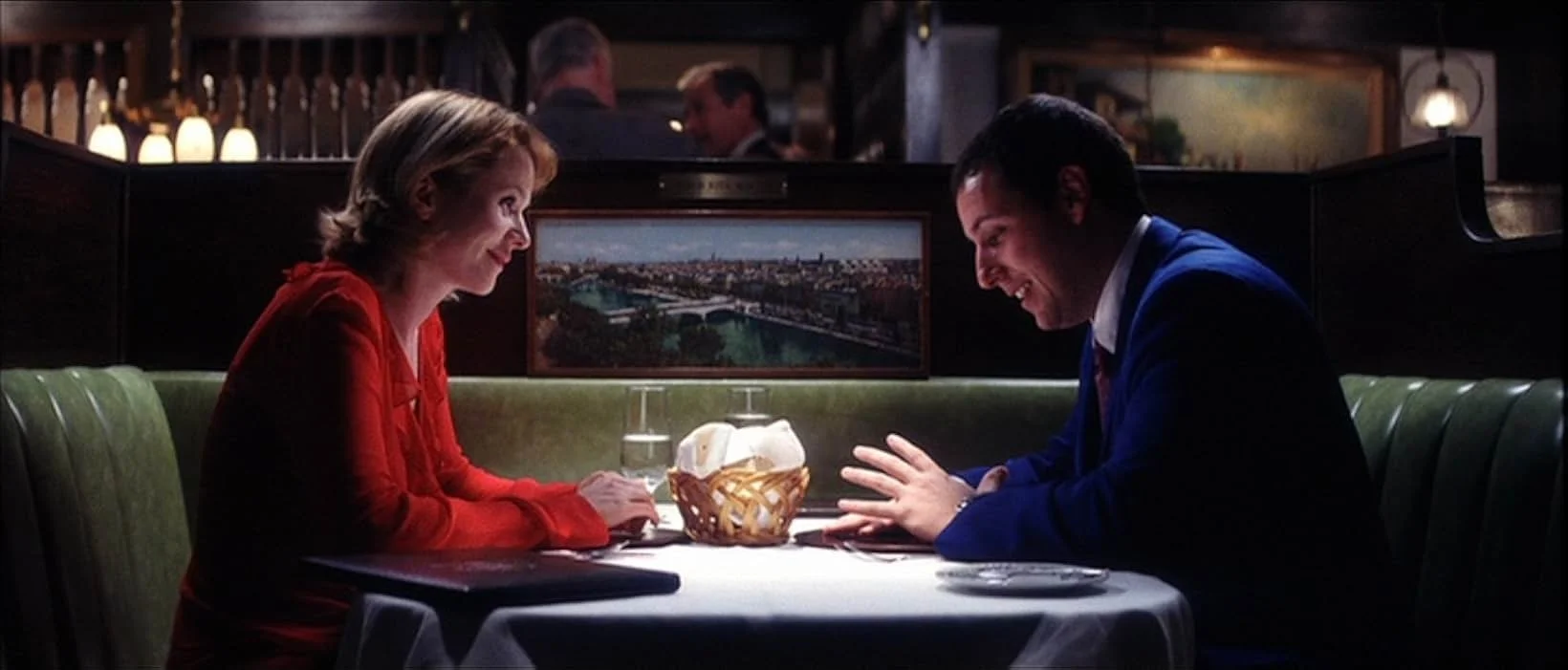Punch-Drunk Love (2002) Review - Director Series
After the muted? Success of Magnolia. It made back its money and then some and earned three Oscar nominations. However, the initial reactions were mixed to positive, but it wasn’t appreciated as PTA anticipated, especially as it is now.
His fourth film is the smallest of his entire filmography; without credits, it comes in just under 90 minutes. By far his shortest film and his least expansive story-wise.
Adam Sandler plays Barry, a man filled with anger and anxiety, mostly brought about by his seven sisters trying to control him, question him, and belittle him. Then everything becomes peaceful when he meets Lena (Emily Watson). He also “battles” the Mattress Man of Provo, Utah.
This was quite a departure for Sandler. It remains a comedic performance, but the film felt more prestigious because of working with an Oscar-nominated filmmaker. Though it’s funny, it’s not goofy like Sandler’s earlier roles.
He’s not playing to make a 13-year-old boy laugh. Adam is perfectly cast; he’s one of the few actors who can find the humor in anger. His outrageous bursts aren’t over-the-top silly; they’re uncomfortably honest. Yet, they never become upsetting. Sandler threads that needle and finds humor in the anger.
On the opposite end of the spectrum, Emily Watson provides warmth and peace. Lena is the deep breath you take after a long scream that is Barry. Emily is resolutely quiet.
Never needing to speak above a whisper, instead she listens and understands Barry, like he’s never been listened to before. They’re complete opposites, and they work harmoniously together. Like the yin to each other’s yang.
PTA has been pretty reserved about his films and their themes/meanings. No offense to Spielberg, but I think PTA is a bit more introspective. I’m referring to the famous clip of Spielberg on “Inside the Actors Studio,” Not realizing Close Encounters of the Third Kind is a film about his parents’ divorce.
PTA met his longtime partner, Maya Rudolph, in 2001. This film comes out in 2002. PTA’s ex-girlfriend has said he had anger issues. All of this seems a little too coincidental. 24 years and four kids later, and I think PTA found his Lena, his peace.
I don’t know if he has or ever will admit it, but this feels like his most personal film. His constant theme of found family suggests he had a rocky relationship with family and now feels like Maya and their kids are the family he was always looking for.
Not only is this a personal film for Paul, but this has become a personal film for me as well. Not the first time I watched this, before I met my wife, but now, after having been married for seven years and knowing my wife for nine.
I was Barry, I am Barry. Maybe my anger outbursts were never as violent as his, but I used to be a very angry person, and I didn’t even know why, until I met my wife. After meeting my wife, I began working on myself, either for her or because of her.
I realized, like Barry, my anger arises from unmet expectations of my family, a constant judgment from them, and an inability to feel like I could be my true self around them. I now have that with Madison, and it is the most freeing thing I could describe to anyone.
Not only freeing, but it is safe. Madison is my safe space. I can tell her anything without judgment; she won’t treat me any differently. She lets me be my authentic self. Madison is my peace. Just like Lena is for Barry.
I get him running to Hawaii for her. I invited Madison on a trip on our second date. I had no rhyme or reason; I just knew she was going to be around for a while. It was an indescribable feeling, the best kind of feeling.
Barry’s Mattress Man battle (Perfectly played by Philip Seymour Hoffman) is an example of being empowered by that special someone in your life. Madison gives me the strength to do things I never believed I could do myself.
PTA perfectly exemplifies anxiety and anger, as well as how those things can dissipate when you meet someone. Especially the right person. Looking at his filmography as a whole, this is the outlier, and yet it appears to be his most special film.
It would explain why this is the only Paul Thomas Anderson film in the Criterion Collection.
5/5 Stars



